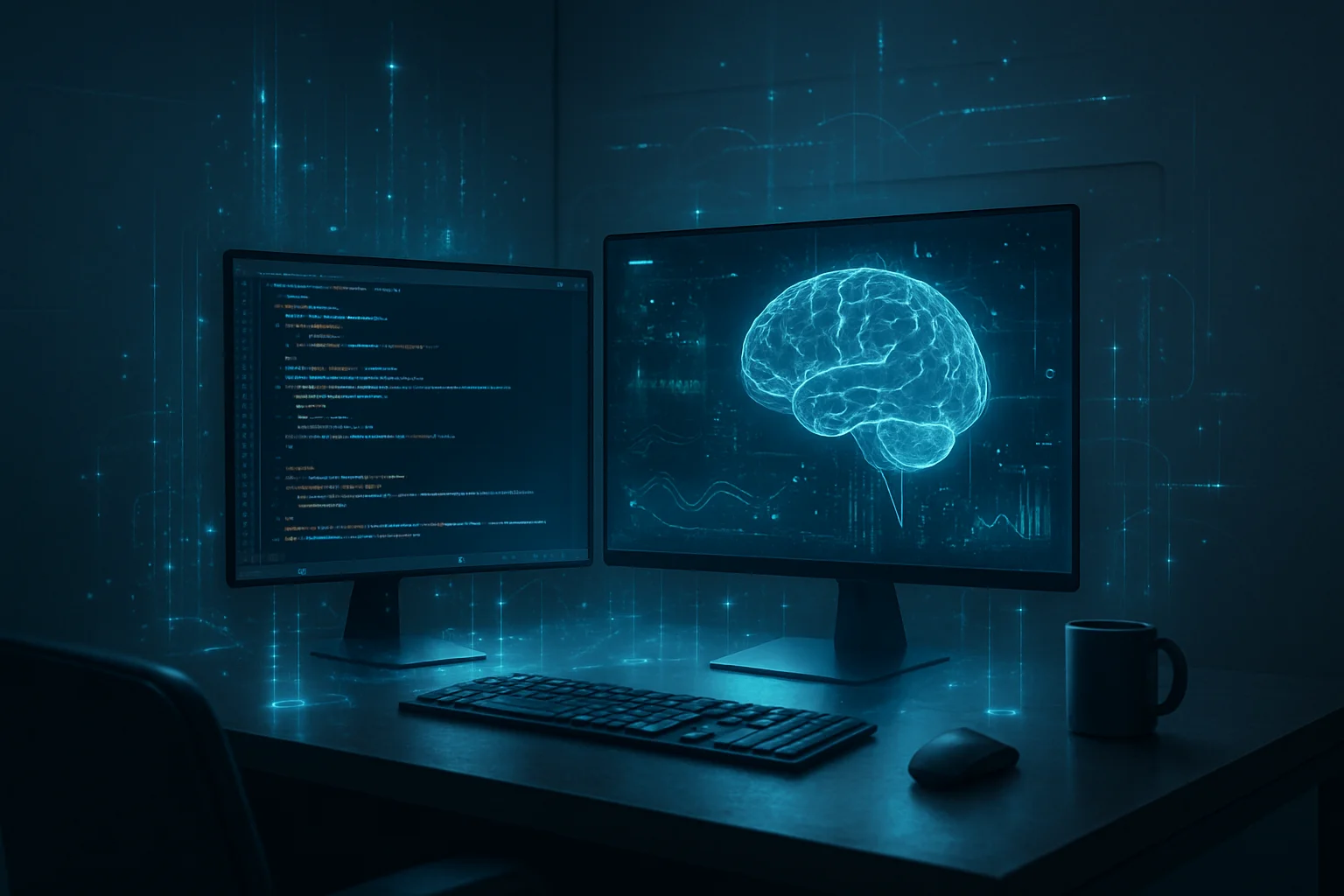Artificial intelligence (AI) has been making waves across industries, transforming how we live, work, and interact with technology. From self-driving cars to intelligent chatbots, AI is being integrated into nearly every field. One area where AI's impact is particularly debated is the programming world. Many people wonder, will AI replace programmers? Will the future of coding be automated by machines, rendering human developers obsolete? This blog explores whether AI will eventually replace coders or if it's just a myth.
In this post, we’ll delve into the current state of AI in programming, its capabilities, limitations, and what the future holds for developers. We’ll also examine whether AI replacing programmers is truly on the horizon or if the human touch will continue to be necessary for coding in the future.
AI in Programming Today: What’s Already Happening?

AI has already begun to make its mark in the programming world. Tools like GitHub Copilot, powered by OpenAI's GPT-3, can suggest entire blocks of code based on a developer’s input. These AI tools assist programmers by reducing the time spent writing repetitive code, offering smart suggestions, and even helping with debugging. But while these tools can make coding more efficient, will AI replace programmers entirely?
At this point, AI is primarily a tool to enhance the programmer's capabilities, not replace them. It assists with tasks like writing code snippets, testing, and offering recommendations, but it doesn’t fully take over the complex problem-solving required in software development. AI replacing coders is something that may happen in specific scenarios, but it’s unlikely to replace programmers entirely, especially in the foreseeable future.
Explore Our Web Design & Development Services
Will Coding Be Replaced by AI?

There is no doubt that AI is changing the way coding is approached. With advancements in machine learning, how to learn AI is becoming an essential skill for developers to predict the next lines of code, and even write entire programs based on basic instructions. But the question remains, will coding be replaced by AI?
In reality, AI replacing coders in the sense of fully automating the software development process is still far from being a reality, especially when it comes to best lead generation for realtors or advertisement examples in the digital space. While AI can certainly assist in the coding process, there are aspects of software development that require human judgment, creativity, and understanding of the problem at hand. For instance, AI-generated code often lacks the intuition and reasoning skills that human programmers possess when approaching a new problem.
The Limitations of AI in Coding
Despite AI's ability to assist with code generation, it has significant limitations. AI systems, including machine learning algorithms, need to be trained on vast datasets of existing code, and they can only work within the boundaries of the information they’ve been trained on. Will artificial intelligence replace programmers when it comes to solving new or novel problems? Probably not. AI’s capacity for creativity and innovative thinking remains far behind that of humans.
Moreover, AI struggles with context-specific issues and high-level decision-making that goes into system design and architecture, something that best SEO reporting tools excel at providing. These tasks require a deep understanding of the problem domain and collaboration with various stakeholders, things AI still can’t handle effectively.
AI Replacing Programmers: A Myth?
Given the advancements in AI, it’s tempting to think that AI will replace programmers someday. But is this really the case? While AI can automate repetitive tasks and assist developers in writing code, the complete replacement of programmers is highly unlikely.
The Importance of Human Creativity
Programming involves more than just writing lines of code. It’s about solving problems, making critical decisions, and working with users and stakeholders to create solutions that meet specific needs. AI tools, while powerful, don’t possess the emotional intelligence, creativity, or strategic thinking that programmers bring to the table. AI replacing programmers in creative and human-centric tasks like project management, client interaction, or business analysis is far-fetched.
Moreover, AI will replace coders in basic, repetitive tasks, but developers still need to be responsible for testing, debugging, and adapting to the ever-changing tech landscape. Programmers also handle multiple projects simultaneously, balancing requirements from different teams, which requires a nuanced understanding of business goals and processes. AI lacks this level of adaptability and decision-making.
Will AI Replace Coders in the Future?
The potential for AI to replace coders in the future is more likely in highly specialized, repetitive coding tasks. For instance, AI tools might handle basic scripting, formatting, or data validation tasks automatically, allowing coders to focus on more complex challenges. But will AI replace coders in the more creative aspects of programming, such as developing new algorithms or designing systems? It’s unlikely.
AI systems can be trained to perform specific tasks based on predefined data and patterns, but when it comes to new and innovative solutions, how to get into digital marketing and human input will still be necessary. The human touch remains vital for tasks requiring deep understanding, critical thinking, and collaboration — skills that web app development services and best SEO reporting tools require, and AI doesn’t possess.
Collaboration Between AI and Developers
Rather than replacing programmers, AI will likely work alongside them, enhancing productivity and assisting with mundane tasks. Developers will become more like “AI managers,” overseeing the work of AI and directing it where necessary. AI might also help in areas like code optimization, bug detection, and code reviews, but developers will remain integral to the process.
The future likely holds a collaborative relationship between human developers and AI tools. Developers will need to understand how to leverage AI effectively to increase their productivity and focus on higher-level tasks. As AI continues to improve, developers will likely spend less time on routine tasks and more on strategic planning and problem-solving.
Will AI Replace Programmers in Shopify Development?
A specific area where AI has had an impact is in eCommerce development, particularly with platforms like Shopify. With the rise of AI tools, eCommerce businesses are seeing an increase in automation for tasks such as content generation, product descriptions, and customer service.AI tools are also assisting Shopify store owners with SEO optimization, customer behavior analysis, AI SEO software, and marketing automation.
While AI is indeed transforming how Shopify stores are developed and managed, it’s important to note that is Shopify legit for developers creating custom solutions, but AI will not replace programmers in the development of complex, custom Shopify features. While certain tasks may be automated, Shopify SEO company services still require human expertise to optimize a store’s search rankings, develop custom themes, and ensure a seamless customer experience. So, will AI replace coders in the Shopify development space? It will definitely assist, but it won't replace the expertise of a skilled developer.
Explore Our Tech Marketing services
The Future of Programming: AI’s Role

As AI technology continues to improve, its role in programming will undoubtedly expand. AI replacing programmers in certain areas is possible, especially in tasks that are repetitive, mundane, or highly standardized. However, for the foreseeable future, human programmers will remain essential for handling complex problems, creative tasks, and the human-centric aspects of software development.
Will Coding Be Automated?
When people ask, will coding be automated by AI, the answer is that automation will certainly increase, but full automation of programming is unlikely. AI replacing coders might occur in certain specific, low-level tasks, but marketing tactics like progressive web solutions require much more than just writing code. AI will streamline processes and help developers work more efficiently, but it will not replace their overall role in development.
FAQs: Will AI Replace Programmers?
Will AI replace programmers?
AI can assist with coding tasks, but it will not replace programmers entirely. Developers still need to handle complex problem-solving, system design, and creativity.
Can AI automate coding?
AI can automate repetitive coding tasks like generating code snippets and debugging. However, it cannot fully automate the entire coding process, especially complex projects.
Will AI replace developers in the future?
AI will support developers but won't replace them. Developers will continue to work on strategic tasks, while AI handles routine coding activities.
How is AI changing programming jobs?
AI is improving programming efficiency by automating tasks like bug detection and code suggestions, allowing developers to focus on more creative and complex work.
Is AI going to replace coders?
AI may replace some tasks coders do, but it won't replace coders themselves. Human input is still essential for creativity, problem-solving, and innovation.
Book Your Free Expert Consultation
Conclusion: Will AI Replace Programmers?
AI is undoubtedly a transformative force in the world of software development, but the idea that AI will replace programmers completely is more myth than reality. While AI will play an increasingly significant role in automating repetitive tasks, debugging, and assisting with code generation, the need for human creativity, strategic thinking, and collaboration will remain essential.
For developers, the key is to embrace AI as a tool that can enhance productivity and improve efficiency, rather than viewing it as a threat to their livelihood. As AI continues to evolve, developers will need to adapt, learn to work alongside AI, and leverage its capabilities to solve more complex problems.
So, the question remains: Is AI going to replace programmers? The answer is no, not entirely. While AI replacing programmers in certain areas is a reality, the need for human input in software development will persist for the foreseeable future. Instead of replacing developers, AI will transform how they work, offering new opportunities for innovation and collaboration.









